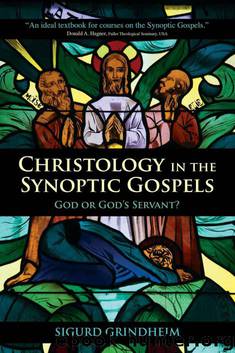Christology in the Synoptic Gospels: God or God's Servant by Sigurd Grindheim

Author:Sigurd Grindheim [Grindheim, Sigurd]
Language: eng
Format: epub
ISBN: 9780567340597
Publisher: Continuum UK
Jesus as God’s Presence in the Community
Matthew’s conviction that Jesus represents God’s presence with his people has influenced his biography of Jesus in a number of ways. Since Jesus’ presence replaces God’s presence, Jesus interacts with the people in a way that echoes God’s interaction with Israel in the Scriptures. When his disciples fail at an exorcism he complains: “you faithless and perverse generation, how much longer must I be with you? How much longer must I put up with you?” (Mt. 17.17). The addressees may be both the disciples and the people at-large. Jesus’ characterization of them (Gr.: genea apistos kai diestrammene) resembles God’s verdict on Israel’s wilderness generation (Gr.: genea skolia kai diestrammene [Deut. 32.5 LXX]). His reluctance to be with the people also mirrors God’s rebuke when he had to withhold his presence from Israel (Exod. 33.3; cf. Deut. 32.20) and lamented “how long?” (Num. 14.27).15
As Jesus is the earthly presence of God, coming to establish a new community, it comes as no surprise that he has taken God’s place vis à vis this community. This role is clearest in the response he gives to Peter’s confession in Mt. 16.17-19: “Blessed are you, Simon son of Jonah! For flesh and blood has not revealed this to you, but my Father in heaven. And I tell you, you are Peter, and on this rock I will build my church, and the gates of Hades will not prevail against it. I will give you the keys of the kingdom of heaven, and whatever you bind on earth will be bound in heaven, and whatever you loose on earth will be loosed in heaven.”
Jesus here presupposes that he has all authority on earth and in heaven (cf. Mt. 28.18b) so that he can give Peter the authority to bind and loose. He now uses this authority to promise that he will build his church (Gr.: ekklesia). The conceptual background is found in the congregation of Israel centered around the tabernacle. This congregation is known as the congregation of the Lord (Hebr.: qahal Yahweh; Num. 16.3; 20.4; Deut. 23.1, 2, 3, 8; 1 Chron. 28.8; Mic. 2.5; cf. 1QM 4.10) or the congregation of God (Hebr.: qahal elohim; Neh. 13.1), a natural consequence of the fact that God brought Israel into existence as a nation and created her (Gen. 12.2; Exod. 19.4-6; Isa. 43.1). Post-exilic writings attest to the expectation that God would re-establish his community around the temple and let his glory return (Tobit 14.5; 2 Maccabees 2.7-8; Jubilees 1.17, 29; 2 Baruch 6.8-9). In Matthew’s Gospel, this expectation is fulfilled by Jesus, who takes God’s place as the builder of his own congregation.
Davies and Allison correctly observe that the background of the Greek term ekklesia in Mt. 16.18 is the concept of Israel as the congregation of God. They also note that Jesus does not speak of God’s church, but rather “my church.” They add: “For Matthew the community belongs to God through Jesus.”16 This conclusion is unwarranted. Matthew does not describe Jesus as such a liaison and the church is never said to be God’s church.
Download
This site does not store any files on its server. We only index and link to content provided by other sites. Please contact the content providers to delete copyright contents if any and email us, we'll remove relevant links or contents immediately.
| Guides | New Testament |
| Old Testament |
The Five People You Meet in Heaven by Mitch Albom(2869)
Name Book, The: Over 10,000 Names--Their Meanings, Origins, and Spiritual Significance by Astoria Dorothy(2513)
Real Sex by Lauren F. Winner(2505)
The Holy Spirit by Billy Graham(2451)
The Secret Power of Speaking God's Word by Joyce Meyer(2275)
How The Mind Works by Steven Pinker(2250)
0041152001443424520 .pdf by Unknown(2247)
ESV Study Bible by Crossway(2211)
Ancient Worlds by Michael Scott(2136)
The Meaning of the Library by unknow(2090)
The Gnostic Gospels by Pagels Elaine(2054)
Churchill by Paul Johnson(2032)
The ESV Study Bible by Crossway Bibles(2024)
MOSES THE EGYPTIAN by Jan Assmann(1993)
Jesus by Paul Johnson(1908)
Ancient Near Eastern Thought and the Old Testament by John H. Walton(1869)
The Complete Dead Sea Scrolls in English (7th Edition) (Penguin Classics) by Geza Vermes(1866)
The Nativity by Geza Vermes(1865)
City of Stairs by Robert Jackson Bennett(1863)
